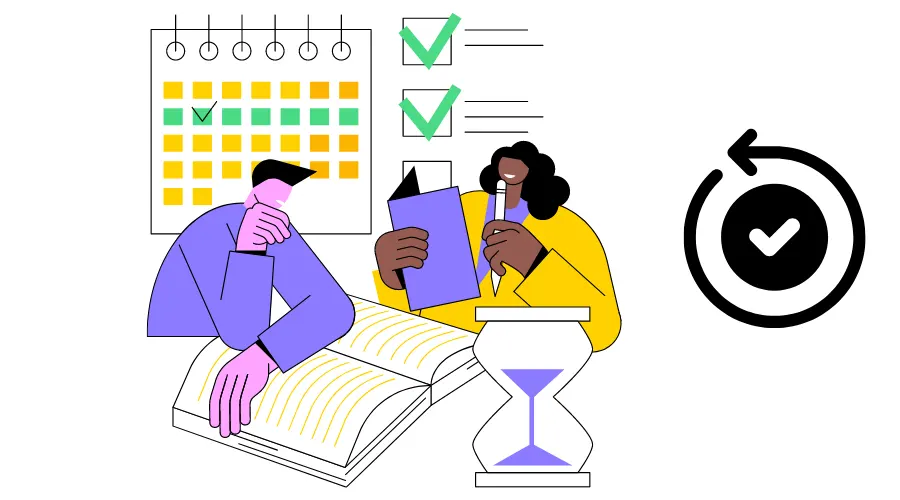The pre-exam period is very stressful for a student, no matter what kind of student they are. This stress is especially high when you have to revise many subjects in a short period.
Revising for exams can be a daunting task, but you can make it easier. How do you do that? With the right techniques, you can make your revision more effective and less stressful.
This guide will give you simple, practical tips on how to revise for exams quickly and effectively, even if you only have a day or a week to spare. Let’s dive into it!
How to Revise for Exams Quickly and Effectively
There are some tips to follow to make your revision process quick and effective before the exam. These may seem difficult, but you have to do them if you want to revise well and finish the subjects.
You can use the techniques given here for any test. So without further ado, let’s quickly understand the techniques.

1. Start Early
I have seen many students who start work late. If you don’t have enough time, then you can do that. But as a student, you have to be a little more strategic. Start your revision months before the exam, not just the day before. This lessens anxiety at the last minute and allows you enough time to cover all the subjects.
2. Create a Revision Timetable
Plan your revision using a schedule. Allocate specific times for each topic, as you want to finish each topic. Stick to your allotted schedule so that you are sure to finish the subjects ahead of time. This ensures that you cover everything and track your progress.
3. Find a Good Study Space
Many students don’t care about this; they think the study environment is not an issue. But this is just their misconception. Because to do any work well, it has to be done in the right environment. So, choose a quiet, tidy place with good lighting. Keep your study materials organized and free from distractions like your phone or TV.
4. Use Different Revision Techniques
Mix up your revision methods. Use flashcards, practice questions, and revision guides. Writing notes from memory and teaching the material to someone else can also help reinforce your learning.
5. Take Regular Breaks
Don’t study for hours without a break. Use techniques like the Pomodoro Technique (25 minutes of study followed by a 5-minute break) to stay focused and fresh.
6. Test Yourself
Before the exam, you must revise with past exam papers. Past exam papers give you a clear idea of how the exam questions will be. A good student always practices past exam questions because it helps them get used to the actual exam format and timing. So practice past exam papers and sample questions for better revision.
How to Use Past Papers:
- Timed Practice: Complete past papers under timed conditions to simulate the actual exam experience. This boosts your capacity for managing your exam time.
- Review Answers: Check your answers against the marking scheme. Identify areas where you made mistakes and focus on improving those areas.
- Identify Patterns: Look for recurring themes or types of questions in past papers. This can give you insights into important topics and how to approach them.
7. Stay Healthy
Your body should work well when you are revising for exams. If not, your time schedule will be disrupted, so you need to get enough sleep at night. Throughout the day, you need to eat healthy foods as well as drink enough water to stay hydrated. A well-rested and nourished brain works much better.
How to Revise for Exams in a Week
If you have a week to revise, follow these steps:
- Create a Revision Plan: Break down your subjects into manageable chunks and allocate time each day.
- Focus on Weak Areas: Spend more time on topics you find difficult.
- Use Different Resources: Combine textbooks, online resources, and revision guides.
- Review Daily: Recap what you’ve studied each day to reinforce learning.
How to Complete Exam Revision in a Day
If you find yourself with only a day to revise, don’t panic. Here’s what you can do:
Prioritize Key Topics: Focus on the most important things when it’s the day before your exam. As your time is short, go through the past papers to identify them.
Use Summary Notes: Use your summary notes or create new ones. Concentrate on the main ideas, formulas, and points.
Stay Calm and Focused: Avoid cramming all night. Get a good night’s sleep so you are alert during the exam.
Frequently Asked Questions (FAQ)
The best revision methods vary for each student, but some effective ones include:
Spaced Repetition: Review information at increasing intervals.
Mind Mapping: Visualize connections between topics.
Practice Papers: Become familiar with the format and types of questions on the exam.
The 2-3-5-7 revision rule is a strategy to help with long-term retention:
2 Days: Review the material 2 days after first learning it.
3 Days: Review again 3 days after the second review.
5 Days: Another review 5 days later.
7 Days: Final review 7 days after the third review.
This spaced repetition helps transfer information from short-term to long-term memory.
Conclusion
Revising for exams doesn’t have to be stressful. By starting early, creating a plan, and using effective revision techniques, you can make the process manageable and even enjoyable. Remember to take care of yourself, stay calm, and keep a positive mindset. Good luck with your exams!
Suggested read:

